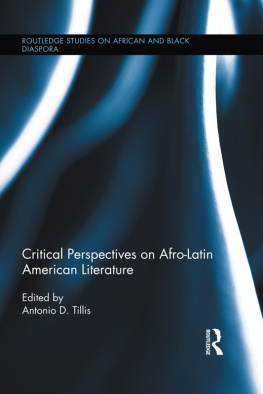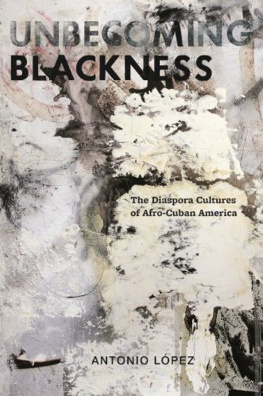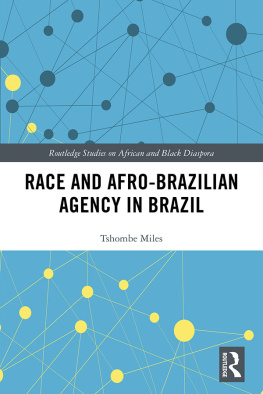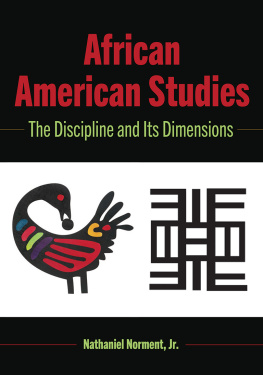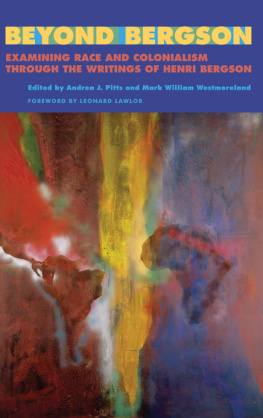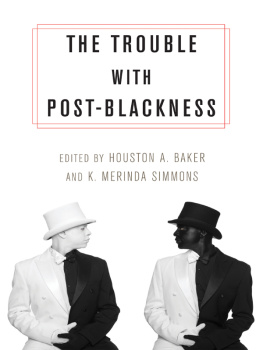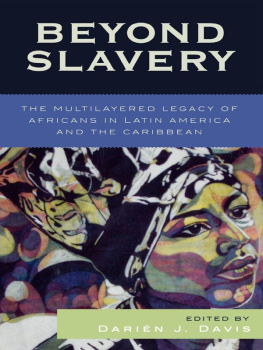Critical Perspectives on Afro-Latin American Literature
Routledge Studies on African and Black Diaspora
SERIES EDITORS: FASSIL DEMISSIE, DePaul University; SANDRA JACKSON, DePaul University; AND ABEBE ZEGEYE, University of South Africa
1 Sex and Race in the Black Atlantic
Mulatto Devils and Multiracial Messiahs
Daniel McNeil
2 Representing the Black Female Subject in Western Art
Charmaine A. Nelson
3 Geographies of the Haitian Diaspora
Edited by Regine O. Jackson
4 Critical Perspectives on Afro-Latin American Literature
Edited by Antonio D. Tillis
Critical Perspectives on Afro-Latin American Literature
Edited by Antonio D. Tillis

First published 2012
by Routledge
711 Third Avenue, New York, NY 10017
Simultaneously published in the UK
by Routledge
2 Park Square, Milton Park, Abingdon, Oxon OX14 4RN
Routledge is an imprint of the Taylor & Francis Group, an informa business
2012 Taylor & Francis
The right of Antonio D. Tillis to be identified as the author of the editorial material, and of the authors for their individual chapters, has been asserted in accordance with sections 77 and 78 of the Copyright, Designs and Patents Act 1988.
All rights reserved. No part of this book may be reprinted or reproduced or utilised in any form or by any electronic, mechanical, or other means, now known or hereafter invented, including photocopying and recording, or in any information storage or retrieval system, without permission in writing from the publishers.
Trademark Notice: Product or corporate names may be trademarks or registered trademarks, and are used only for identification and explanation without intent to infringe.
Library of Congress Cataloging-in-Publication Data
Critical perspectives on Afro-Latin American literature / edited by Antonio D. Tillis.
p. cm. (Routledge studies on African and black diaspora)
Includes bibliographical references and index.
1. Latin American literatureAfrican influences. 2. BlacksLatin AmericaEthnic identity. 3. BlacksCaribbean AreaEthnic identity. 4. Identity (Psychology) in literature. I. Tillis, Antonio D.
PQ7081.C736 2011
860.9'89608dc23
2011018101
ISBN13: 978-0-415-89627-6 (hbk)
ISBN13: 978-0-203-80750-7 (ebk)
Introduction
Antonio D. Tillis
In 1977, Miriam DeCosta compiled what is arguably the first collection of scholarly essays devoted to the literary production of Latin Americans of African decent, Afro-Latin Americans. The edited volume, Blacks in Hispanic Literature, is a collection of fourteen critical essays from the considered pioneers in the development of Afro-Hispanic studies. It becomes clear to differentiate between typologies. Afro-Latin American studies is the broad, overarching category used for engaging the cultures and civilizations of Diasporic Africans in Latin America, broadly defined encompassing the totality of the Americas and the Caribbean islands. Linguistically, Afro-Latin America refers to regions where the Latin-based imperial languages of Spanish, French, Portuguese, and their derivations (Creole, Patois, etc.) are the predominant media for communicative discourse. Afro-Hispanic however, is more focused in terms of scope referring to a specific geographic and linguistic modality, Spanish, and landmasses that emerge as former Spanish colonies in the Americas. Thus, the geographic and linguistic representations of Blackness in DeCostas compiled work is situated in the commonly referred to area of Spanish-America. DeCosta rightly credits the genesis of Afro-Hispanic studies to the 1930s stating, Critical appraisals of Afro-Hispanic studies were undertaken in the Thirties with the pioneer studies of Carter G. Woodson, Valaurez B. Spratlin and John F. Matheus (ix). DeCosta continues to mention the scant, but pivotal, academic journals that served as repositories for this budding scholarship such as the Journal of Negro History and the College Language Association Journal. That which is implicit is the fact that Black scholars in the first half of the twentieth century, particularly in the 1930s when Woodson, Spratlin, and Matheus were publishing, had very few venues in which to publish their scholarship, as the discriminatory reign of Jim Crow America did not exclude academia. Two major points of importance credited to DeCostas work are its comparative appeal regarding the Black Diaspora and its exposing works by Black writers in Spanish America to a wider English-speaking audience. She states in the introduction:
It (the collection) is designed to acquaint the English-speaking scholar with a body of literature with which he may be unfamiliar, as well as to serve as a basis of comparison and contrast with other African and neo-African literatures to determine if there is a Black Aesthetic which transcends linguistic and cultural barriers. (x)
Thanks to DeCostas seminal collection, in 1979, Richard Jackson published Black Writers in Latin America, thus beginning critical texts engaging the history, culture, and traditions, literary and non-literary, of Blacks in principally the Spanish-speaking world. However, since DeCostas 1977 work, there has yet to be a critical edition engaging Afro-Latin American literature. Certainly, there have been historical and literary analyses published on Afro-Latin American literature such as Marvin Lewiss multiple works that bring to the academic fore works by Black writers in Argentina, Colombia, Venezuela, as well as Norman Whittens 1974 work Black Frontiersman: Afro-Hispanic Culture of Ecuador and Colombia. However, DeCostas is the sole work that serves as a compilation of critical essays by American scholars that renders critical approaches to literary works by Black authors in Spanish America. Arguably, her Daughters of the Diaspora: Afra Hispanic Writers (2003) could be viewed as such a work; however, it functions more as a literary anthology, highlighting the work of twenty female writers of African ancestry in Spanish America accompanied by a short critical piece on each writer showcased.
This collection of eleven chapters serves as a compliment to DeCostas 1977 edited work. It bridges the over seventy-year gap and serves as the second collection of essays published in the U.S. on the literary works of Afro-Latin Americans. The eleven chapters represent authors from Spanish-America, Brazil, and by extension, Equatorial Guinea, the only former Spanish colony in Africa. Additionally, this collection extends beyond the conventional concept of writings that constitute literature by analyzing contemporary musical lyrics of rap and hip-hop as poetic texts. The chapters in this collection represent a variance of contemporary theoretical paradigms from transnationalism, cosmopolitanism, feminism, and nationalism to inquiries of canonicity, and the Latin American historical novel. It is the first to include works by authors from Equatorial Guinea, thus bridging Africa and the Americas. It is the hope that this compilation of critical works will stimulate further discussion on African Diasporic literature and other cultural forms. Additionally, the aim is to provide a critical text that can be used in African Diaspora programs that offer a basis for interrogating comparatively the cultural production of writers of African ancestry in the Americas, the Caribbean, and Africa.
In the area of literary studies and the African Diaspora, Afro-Latin American literature represents a booming corpus of intellectual and critical investigation. Suffice it to say, scholars, independent researchers, and enthusiasts throughout the world are beginning to render critical approaches to this darker boom in Latin American letters. Virtually rendered invisible by the U.S. academy until the 1970s, writing by Latin Americans of African ancestry represented a vacuous space in critical anthologies and literary histories. Thus, this volume will augment the existing critical literature. Scholars in the area of African Diaspora Studies, Black Studies, Latin American Studies, and American literature (broadly defined) will be able to utilize the eleven chapters in this edition to enhance classroom instruction and further academic research. The chapter on Equatorial Guinean drama, in particular, will allow scholars, students, and enthusiasts to contextually connect Africa to the history of Spanish colonization, thus, forging a historical link between Africa and Spanish America. In essence, the importance of Latin America literature to the discipline of African Diaspora studies is immeasurable. This volume provides, from the standpoint of literary studies, a ripe cultural context for critical comparative analysis among the vast geographies that encompass African and African Diaspora studies. Finally, this volume presents the works of African and African Diaspora writers who have yet to garner the critical attention deserved. Of the writers presented, Cubas Nancy Morejn, Puerto Ricos Ana Lydia Vega, and Colombias Manuel Zapata Olivella are the most recognizable, as they have been anthologized in numerous anthologies and literary historical texts on Latin America. An added benefit of this volume is the presentation of lesser known writers from Peru, Equatorial Guinea, Costa Rica, and Panama, to name a few. The inclusion of writers such as Toms vila, Trinidad Morgades (Equatorial Guinea), Luca Charn-Illescas, Nicomedes Santa Cruz (Peru), Conceio Evaristo (Brazil), Eulalia Bernard (Costa Rica), and Carlos Guillermo Wilson, among others, offers for the readership a more expansive presentation of writers that have been overlooked and or ignored. This volume purposes to present to the reading audience an introduction to their literary worlds and to their perceptions and recalibrations of nation, national culture, and national identity.
Next page
